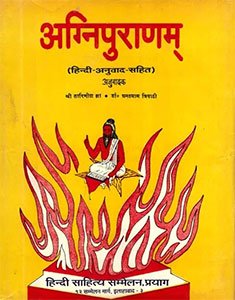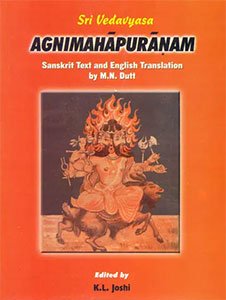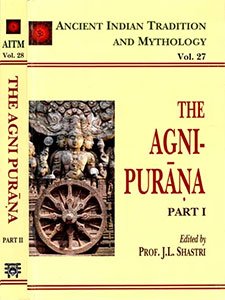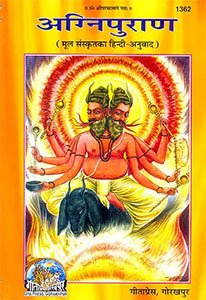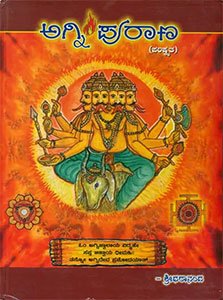Agni Purana [sanskrit]
97,288 words
This Sanskrit edition of the Agnipurana. It is one of the traditional eighteen Mahapuranas presented as an encyclopedia of ancient Indian history and knowledge. It contains either 382 or 383 chapters and over 10.000 verses (Sanskrit Shlokas).
Verse 85.17
सूत्रं देहे स्वमन्त्रेण प्रविश्यैनां वियोजयेत् ।
ओं हां खीं हां प्रतिष्ठाकलापाशाय ओं फट् स्वाहान्तेनानैनैव पूरकेणाङ्कुशमुद्रया समाकर्षेत् ततः ओं हां ह्रूं ह्रां ह्रूं प्रतितष्ठा कलापाशाय ह्रं फडित्यनेन संहारमुद्रया कुम्भकेन हृदयादधो नाडीसूत्रादादाय ओं हां ह्रूं ह्रां हां प्रतिष्ठाकलापाशाय नम इत्यनेनोद्भवमुद्रया रेचकेन कुम्भे समारोपयेत् ओं हां ह्रीं प्रतिष्ठाकलापशाय नम इत्यनेनार्च्चयित्वा सम्पूज्य स्वाहान्तेनाहुतीनां त्रयेण सन्निधाय ततः ओं हां विष्णवे नम इति विष्णुमावाह्य सम्पूज्य सन्तर्प्य ।
विष्णो तवाधिकारेऽस्मिन् मुमुक्षुं दीक्षयाम्यहं ॥ १७ ॥
sūtraṃ dehe svamantreṇa praviśyaināṃ viyojayet |
oṃ hāṃ khīṃ hāṃ pratiṣṭhākalāpāśāya oṃ phaṭ svāhāntenānainaiva pūrakeṇāṅkuśamudrayā samākarṣet tataḥ oṃ hāṃ hrūṃ hrāṃ hrūṃ pratitaṣṭhā kalāpāśāya hraṃ phaḍityanena saṃhāramudrayā kumbhakena hṛdayādadho nāḍīsūtrādādāya oṃ hāṃ hrūṃ hrāṃ hāṃ pratiṣṭhākalāpāśāya nama ityanenodbhavamudrayā recakena kumbhe samāropayet oṃ hāṃ hrīṃ pratiṣṭhākalāpaśāya nama ityanenārccayitvā sampūjya svāhāntenāhutīnāṃ trayeṇa sannidhāya tataḥ oṃ hāṃ viṣṇave nama iti viṣṇumāvāhya sampūjya santarpya |
viṣṇo tavādhikāre'smin mumukṣuṃ dīkṣayāmyahaṃ || 17 ||
The Sanskrit text of Verse 85.17 is contained in the book The Agni Puranam (Anandashram Edition) by Shri Chimna Apate (श्री चिमणा आपटे). This book is available online or you could buy the latest edition:
Read online Buy now! The Sanskrit text by Shri Chimna Apate (श्री चिमणा आपटे) (1987)
Glossary of Sanskrit terms
Note: This extracts Sanskrit terms and links to English definitions from the glossary, based on an experimental segmentation of verse (85.17). Some terms could be superfluous while some might not be mentioned. Click on the word to show English definitions.
Sutra, Deha, Svamantra, Pravishya, Aina, Pratishtha, Kalapa, Phat, Svaha, Tenana, Puraka, Ankushamudra, Sama, Tatah, Tad, Tata, Hram, Prati, Ashaya, Iti, Itya, Ana, Anena, Idam, Samharamudra, Kumbhaka, Hridaya, Adhah, Adhas, Nadi, Nama, Namas, Udbhava, Udra, Recaka, Kumbha, Hrim, Sha, Shaya, Sampujya, Tena, Ahuti, Traya, Sannidha, Vishnu, Avahya, Santarpya, Yushmad, Adhikara, Mumukshu, Aha, Asmad,
Analysis of Sanskrit grammar
Note: this is an experimental feature and only shows the first possible analysis of the Sanskrit text (Verse 85.17). If the system was successful in segmenting the sentence, you will see of which words it is made up of, generally consisting of Nouns, Pronouns, Verbs, Participles and Indeclinables. Click on the link to show all possible derivations of the word.
- Line 1: “sūtraṃ dehe svamantreṇa praviśyaināṃ viyojayet ”
- sūtram -
-
sūtra (noun, neuter)[adverb], [nominative single], [accusative single]
- dehe -
-
deha (noun, masculine)[locative single]deha (noun, neuter)[nominative dual], [vocative dual], [accusative dual], [locative single]
- svamantreṇa -
-
svamantra (noun, masculine)[instrumental single]svamantra (noun, neuter)[instrumental single]
- praviśyai -
-
praviśya (noun, masculine)[compound], [vocative single]praviśya (noun, neuter)[compound], [vocative single]
- ainā -
-
aina (noun, masculine)[compound], [vocative single]
- am -
-
a (noun, masculine)[adverb], [accusative single]ā (noun, feminine)[adverb]e (noun, masculine)[accusative single]
- viyo -
-
vī (noun, feminine)[nominative plural], [vocative plural], [accusative plural], [ablative single], [genitive single]vī (noun, masculine)[nominative plural], [vocative plural], [accusative plural], [ablative single], [genitive single]
- jayet -
-
√ji (verb class 1)[optative active third single]
- Line 2: “oṃ hāṃ khīṃ hāṃ pratiṣṭhākalāpāśāya oṃ phaṭ svāhāntenānainaiva pūrakeṇāṅkuśamudrayā samākarṣet tataḥ oṃ hāṃ hrūṃ hrāṃ hrūṃ pratitaṣṭhā kalāpāśāya hraṃ phaḍityanena saṃhāramudrayā kumbhakena hṛdayādadho nāḍīsūtrādādāya oṃ hāṃ hrūṃ hrāṃ hāṃ pratiṣṭhākalāpāśāya nama ityanenodbhavamudrayā recakena kumbhe samāropayet oṃ hāṃ hrīṃ pratiṣṭhākalāpaśāya nama ityanenārccayitvā sampūjya svāhāntenāhutīnāṃ trayeṇa sannidhāya tataḥ oṃ hāṃ viṣṇave nama iti viṣṇumāvāhya sampūjya santarpya ”
- Cannot analyse om*hā
- hām -
-
hā (noun, feminine)[accusative single]
- Cannot analyse khīm*hā
- hām -
-
hā (noun, feminine)[accusative single]
- pratiṣṭhā -
-
pratiṣṭhā (noun, feminine)[nominative single]
- kalāpā -
-
kalāpa (noun, masculine)[compound], [vocative single]
- aśāya* -
-
- Cannot analyse om*ph
- phaṭ -
-
phaṭ (indeclinable)[indeclinable]
- svāhān -
-
svāha (noun, masculine)[accusative plural]
- tenānai -
-
√tan -> tenāna (participle, masculine)[vocative single from √tan class 8 verb]√tan -> tenāna (participle, neuter)[vocative single from √tan class 8 verb]√tan -> tenānā (participle, feminine)[nominative single from √tan class 8 verb]√tan -> tenāna (participle, masculine)[vocative single from √tan class 4 verb]√tan -> tenāna (participle, neuter)[vocative single from √tan class 4 verb]√tan -> tenānā (participle, feminine)[nominative single from √tan class 4 verb]√tan -> tenāna (participle, masculine)[vocative single from √tan class 1 verb]√tan -> tenāna (participle, neuter)[vocative single from √tan class 1 verb]√tan -> tenānā (participle, feminine)[nominative single from √tan class 1 verb]
- ainai -
-
aina (noun, masculine)[compound], [vocative single]
- aiva -
-
√i (verb class 2)[imperfect active first dual]
- pūrakeṇā -
-
pūraka (noun, masculine)[instrumental single]pūraka (noun, neuter)[instrumental single]
- aṅkuśamudrayā -
-
aṅkuśamudrā (noun, feminine)[instrumental single]
- samā -
-
samā (noun, feminine)[nominative single]samā (Preverb)[Preverb]
- karṣet -
-
√kṛṣ (verb class 1)[optative active third single]
- tataḥ -
-
tataḥ (indeclinable adverb)[indeclinable adverb]tataḥ (indeclinable correlative)[indeclinable correlative]tataḥ (indeclinable)[indeclinable]tad (noun, neuter)[ablative single], [ablative dual], [ablative plural]tata (noun, masculine)[nominative single]√tan -> tata (participle, masculine)[nominative single from √tan class 8 verb]sa (noun, masculine)[ablative single], [ablative dual], [ablative plural]sā (noun, feminine)[ablative single], [ablative dual], [ablative plural]
- Cannot analyse om*hā
- hām -
-
hā (noun, feminine)[accusative single]
- Cannot analyse hrūm*hr
- hrām -
-
hrām (indeclinable)[indeclinable]
- Cannot analyse hrūm*pr
- prati -
-
prati (indeclinable adverb)[indeclinable adverb]prati (noun, masculine)[compound], [adverb]pratī (noun, masculine)[adverb], [vocative single]pratī (noun, feminine)[compound], [adverb], [vocative single]pratī (noun, neuter)[compound], [adverb], [nominative single], [vocative single], [accusative single]prati (Preverb)[Preverb]
- taṣṭhā -
-
- kalāpā -
-
kalāpa (noun, masculine)[compound], [vocative single]
- aśāya -
-
aśāya (noun, masculine)[compound], [vocative single]aśāya (noun, neuter)[compound], [vocative single]
- Cannot analyse hram*ph
- phaḍ -
-
phaṭ (indeclinable)[indeclinable]
- itya -
-
iti (indeclinable particle)[indeclinable particle]iti (noun, feminine)[compound], [adverb], [nominative dual], [vocative dual], [accusative dual]itya (noun, masculine)[compound], [vocative single]itya (noun, neuter)[compound], [vocative single]√i -> itya (absolutive)[absolutive from √i]√i -> itya (participle, masculine)[vocative single from √i class 2 verb]√i -> itya (participle, neuter)[vocative single from √i class 2 verb]
- anena -
-
anena (noun, masculine)[compound], [vocative single]anena (noun, neuter)[compound], [vocative single]ana (noun, masculine)[instrumental single]idam (pronoun, masculine)[instrumental single]idam (pronoun, neuter)[instrumental single]
- saṃhāramudrayā -
-
saṃhāramudrā (noun, feminine)[instrumental single]
- kumbhakena -
-
kumbhaka (noun, masculine)[instrumental single]kumbhaka (noun, neuter)[instrumental single]
- hṛdayād -
-
hṛdaya (noun, masculine)[adverb], [ablative single]hṛdaya (noun, neuter)[adverb], [ablative single]
- adho* -
-
adhaḥ (indeclinable preposition)[indeclinable preposition]adhaḥ (indeclinable)[indeclinable]adhas (noun, neuter)[compound], [nominative single], [vocative single], [accusative single]
- nāḍī -
-
nāḍī (noun, feminine)[compound], [nominative single]nāḍi (noun, feminine)[nominative dual], [vocative dual], [accusative dual]nāḍi (noun, masculine)[nominative dual], [vocative dual], [accusative dual]
- sūtrād -
-
sūtra (noun, neuter)[adverb], [ablative single]
- ādāya* -
-
- Cannot analyse om*hā
- hām -
-
hā (noun, feminine)[accusative single]
- Cannot analyse hrūm*hr
- hrām -
-
hrām (indeclinable)[indeclinable]
- hām -
-
hā (noun, feminine)[accusative single]
- pratiṣṭhā -
-
pratiṣṭhā (noun, feminine)[nominative single]
- kalāpā -
-
kalāpa (noun, masculine)[compound], [vocative single]
- aśāya -
-
aśāya (noun, masculine)[compound], [vocative single]aśāya (noun, neuter)[compound], [vocative single]
- nama* -
-
namas (noun, masculine)[compound], [vocative single]namas (noun, neuter)[compound], [nominative single], [vocative single], [accusative single]nama (noun, masculine)[nominative single]
- itya -
-
iti (indeclinable particle)[indeclinable particle]iti (noun, feminine)[compound], [adverb], [nominative dual], [vocative dual], [accusative dual]itya (noun, masculine)[compound], [vocative single]itya (noun, neuter)[compound], [vocative single]√i -> itya (absolutive)[absolutive from √i]√i -> itya (participle, masculine)[vocative single from √i class 2 verb]√i -> itya (participle, neuter)[vocative single from √i class 2 verb]
- aneno -
-
anena (noun, masculine)[compound], [vocative single]anena (noun, neuter)[compound], [vocative single]ana (noun, masculine)[instrumental single]anenā (noun, feminine)[nominative single]idam (pronoun, masculine)[instrumental single]idam (pronoun, neuter)[instrumental single]
- udbhavam -
-
udbhava (noun, masculine)[adverb], [accusative single]udbhavā (noun, feminine)[adverb]
- udra -
-
udra (noun, masculine)[compound], [vocative single]udra (noun, neuter)[compound], [vocative single]
- yā* -
-
yā (noun, feminine)[nominative plural], [accusative plural]yā (pronoun, feminine)[nominative plural], [accusative plural]
- recakena -
-
recaka (noun, masculine)[instrumental single]recaka (noun, neuter)[instrumental single]
- kumbhe -
-
kumbha (noun, masculine)[locative single]kumbha (noun, neuter)[nominative dual], [vocative dual], [accusative dual], [locative single]kumbhā (noun, feminine)[nominative dual], [vocative single], [vocative dual], [accusative dual]
- samā -
-
samā (noun, feminine)[nominative single]samā (Preverb)[Preverb]
- ropayet -
-
√ruh (verb class 0)[optative active third single]
- Cannot analyse om*hā
- hām -
-
hā (noun, feminine)[accusative single]
- hrīm -
-
hrīm (indeclinable)[indeclinable]
- pratiṣṭhā -
-
pratiṣṭhā (noun, feminine)[nominative single]
- kalāpa -
-
kalāpa (noun, masculine)[compound], [vocative single]
- śāya -
-
śāya (noun, masculine)[compound], [vocative single]śāya (noun, neuter)[compound], [vocative single]śa (noun, masculine)[dative single]śa (noun, neuter)[dative single]√śā -> śāya (participle, masculine)[vocative single from √śā class 3 verb], [vocative single from √śā class 4 verb]√śā -> śāya (participle, neuter)[vocative single from √śā class 3 verb], [vocative single from √śā class 4 verb]
- nama* -
-
- Cannot analyse ityanenārccayitvā*sa
- sampūjya -
-
sampūjya (noun, masculine)[compound], [vocative single]sampūjya (noun, neuter)[compound], [vocative single]
- svāhān -
-
svāha (noun, masculine)[accusative plural]
- tenā -
-
tena (noun, masculine)[compound], [vocative single]ta (noun, masculine)[instrumental single]ta (noun, neuter)[instrumental single]tad (noun, neuter)[instrumental single]sa (noun, masculine)[instrumental single]√tan (verb class 8)[perfect active second plural]√tan (verb class 4)[perfect active second plural]√tan (verb class 1)[perfect active second plural]
- āhutīnām -
-
āhuti (noun, feminine)[genitive plural]āhuti (noun, masculine)[genitive plural]āhutī (noun, masculine)[genitive plural]āhutī (noun, feminine)[genitive plural]āhutī (noun, neuter)[genitive plural]
- trayeṇa -
-
traya (noun, masculine)[instrumental single]traya (noun, neuter)[instrumental single]
- sannidhāya -
-
sannidha (noun, neuter)[dative single]
- tataḥ -
-
tataḥ (indeclinable adverb)[indeclinable adverb]tataḥ (indeclinable correlative)[indeclinable correlative]tataḥ (indeclinable)[indeclinable]tad (noun, neuter)[ablative single], [ablative dual], [ablative plural]tata (noun, masculine)[nominative single]√tan -> tata (participle, masculine)[nominative single from √tan class 8 verb]sa (noun, masculine)[ablative single], [ablative dual], [ablative plural]sā (noun, feminine)[ablative single], [ablative dual], [ablative plural]
- Cannot analyse om*hā
- hām -
-
hā (noun, feminine)[accusative single]
- viṣṇave -
-
viṣṇu (noun, feminine)[dative single]viṣṇu (noun, masculine)[dative single]
- nama* -
-
namas (noun, masculine)[compound], [vocative single]namas (noun, neuter)[compound], [nominative single], [vocative single], [accusative single]nama (noun, masculine)[nominative single]
- iti -
-
iti (indeclinable particle)[indeclinable particle]iti (noun, feminine)[compound], [adverb]
- viṣṇum -
-
viṣṇu (noun, feminine)[accusative single]viṣṇu (noun, masculine)[accusative single]
- āvāhya -
-
āvāhya (noun, masculine)[compound], [vocative single]āvāhya (noun, neuter)[compound], [vocative single]
- sampūjya -
-
sampūjya (noun, masculine)[compound], [vocative single]sampūjya (noun, neuter)[compound], [vocative single]
- santarpya -
-
santarpya (noun, masculine)[compound], [vocative single]santarpya (noun, neuter)[compound], [vocative single]
- Line 3: “viṣṇo tavādhikāre'smin mumukṣuṃ dīkṣayāmyahaṃ ”
- viṣṇo -
-
viṣṇu (noun, feminine)[vocative single]viṣṇu (noun, masculine)[vocative single]
- tavā -
-
yuṣmad (pronoun, none)[genitive single]
- adhikāre' -
-
adhikāra (noun, masculine)[locative single]
- asmin -
-
idam (pronoun, masculine)[locative single]idam (pronoun, neuter)[locative single]
- mumukṣum -
-
mumukṣu (noun, masculine)[accusative single]mumukṣu (noun, feminine)[accusative single]
- dīkṣayāmya -
-
√dīkṣ (verb class 0)[present active first single]
- aham -
-
aha (noun, neuter)[adverb], [nominative single], [accusative single]asmad (pronoun, none)[nominative single]
Other editions:
Also see the following editions of the Sanskrit text or (alternative) English translations of the Verse 85.17
Agni Purana with Hindi Translation
by Tarinish Jha and Dr. Ghanshayam Tripathi (तारिणीश् झा और डॉ. घनश्याम त्रिपाठी) (2007)
Publisher: Hindi Sahitya Sammelan, Allahabad; 1199 pages; Title: अग्निपुराणम् (संस्कृत एवं हिन्दी अनुवाद);
Buy now!
Agni Purana (Two Volumes)
by M. N. Dutt (2023)
Publisher: Parimal Publication Pvt. Ltd.; Editor: K. L. Joshi.; ISBN-10: 8171101690; ISBN-13: 9788171101696; 1070 pages.
Buy now!
Agni-Purana (Set of 4 Volumes)
by N. Gangadharan (2006)
Publisher: Motilal Banarsidass Publishers Pvt. Ltd.; ISBN: Part I 8120803590 (9788120803596); Part II 8120803604 (9788120803602); Part III 8120801741 (9788120801745); Part IV 812080306X (9788120803060); 1271 pages.
Buy now!
The Agni Purana (Hindi)
by (2013)
Publisher: Gita Press, Gorakhpur; Title: अग्निपुराण (केवल हिन्दी अनुवाद); ISBN-10: 8129302934; ISBN-13: 9788129302939; 848 pages.
Buy now!
Agni Purana (Kannada)
by Sreedharananda (2013)
Publisher: Pooja Pusthaka Bhandara, Bangalore; Title: ಅಗ್ನಿ ಪುರಾಣ; 560 pages.
Buy now!Preview of verse 85.17 in Kannada sript:
ಸೂತ್ರಂ ದೇಹೇ ಸ್ವಮನ್ತ್ರೇಣ ಪ್ರವಿಶ್ಯೈನಾಂ ವಿಯೋಜಯೇತ್ ।
ಓಂ ಹಾಂ ಖೀಂ ಹಾಂ ಪ್ರತಿಷ್ಠಾಕಲಾಪಾಶಾಯ ಓಂ ಫಟ್ ಸ್ವಾಹಾನ್ತೇನಾನೈನೈವ ಪೂರಕೇಣಾಙ್ಕುಶಮುದ್ರಯಾ ಸಮಾಕರ್ಷೇತ್ ತತಃ ಓಂ ಹಾಂ ಹ್ರೂಂ ಹ್ರಾಂ ಹ್ರೂಂ ಪ್ರತಿತಷ್ಠಾ ಕಲಾಪಾಶಾಯ ಹ್ರಂ ಫಡಿತ್ಯನೇನ ಸಂಹಾರಮುದ್ರಯಾ ಕುಮ್ಭಕೇನ ಹೃದಯಾದಧೋ ನಾಡೀಸೂತ್ರಾದಾದಾಯ ಓಂ ಹಾಂ ಹ್ರೂಂ ಹ್ರಾಂ ಹಾಂ ಪ್ರತಿಷ್ಠಾಕಲಾಪಾಶಾಯ ನಮ ಇತ್ಯನೇನೋದ್ಭವಮುದ್ರಯಾ ರೇಚಕೇನ ಕುಮ್ಭೇ ಸಮಾರೋಪಯೇತ್ ಓಂ ಹಾಂ ಹ್ರೀಂ ಪ್ರತಿಷ್ಠಾಕಲಾಪಶಾಯ ನಮ ಇತ್ಯನೇನಾರ್ಚ್ಚಯಿತ್ವಾ ಸಮ್ಪೂಜ್ಯ ಸ್ವಾಹಾನ್ತೇನಾಹುತೀನಾಂ ತ್ರಯೇಣ ಸನ್ನಿಧಾಯ ತತಃ ಓಂ ಹಾಂ ವಿಷ್ಣವೇ ನಮ ಇತಿ ವಿಷ್ಣುಮಾವಾಹ್ಯ ಸಮ್ಪೂಜ್ಯ ಸನ್ತರ್ಪ್ಯ ।
ವಿಷ್ಣೋ ತವಾಧಿಕಾರೇಽಸ್ಮಿನ್ ಮುಮುಕ್ಷುಂ ದೀಕ್ಷಯಾಮ್ಯಹಂ ॥ ೧೭ ॥
![Agni Purana [sanskrit] - book cover](/uploads/a/Agni-Purana-Sanskrit.jpg)
